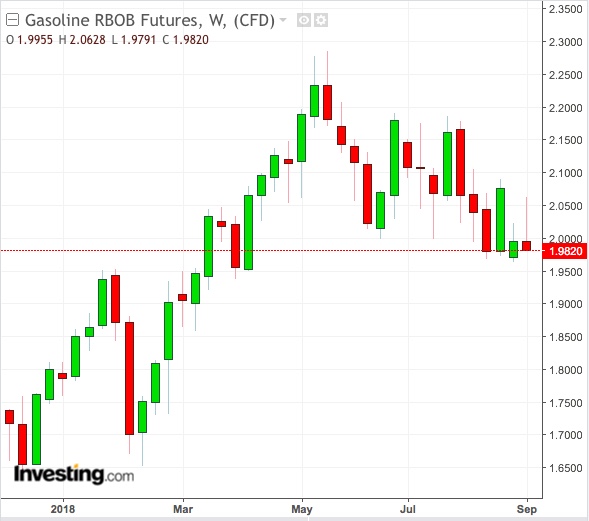Ease your feet off the pedal, gasoline fans: prices of the fuel are unlikely to race much higher for now, with some traders betting on a drop of as much as 10 percent through October. With Monday’s Labor Day unofficially flagging an end to summer road trips in the US, the view for gasoline futures on the New York Mercantile Exchanges is decidedly bearish.
Until June, gasoline had some of the most stellar returns for investors betting on higher prices of the motor fuel, with February being the market’s only negative month in the first half. But it fell nearly 9 percent in total over July and August as some of the weakness in US crude oil carried over.
Year-to-date, gasoline remains up 10 percent. But lower settlements on Friday and Tuesday—leading into the Labor Day weekend and just after—signal softening confidence in a market used to seeing stronger sentiment this time of year.

Investing.com’s technicals have been calling for a “Strong Sell” on gasoline. The fuel, specifically referred to as Reformulated Blendstock for Oxygenate Blending (RBOB), could spend the coming weeks under $2 per gallon—a level that the so-called bulls in RBOB had fought so hard to stay above since April.
A “Very Lucrative” Short
“During this morning’s highs, it went up to $2.06 per gallon and we shorted it right away and it came down to $1.98,” Phil Davis, trader at PSW Investments in New York, said in an interview with Investing.com on Tuesday. “That was a gain of about $2,500 per contract, a very lucrative short for us.” He added:
“From here, we’re expecting RBOB to go down to between $1.80 and $1.85 over the next month and stabilize there...There’ll be the traditional pre-Thanksgiving run up, where it could get a little higher, and we’ll be shorting it again at that time.”
In Davis’ logic, gasoline’s surge to 3-1/2 year highs of $2.2855 in May, matching US crude’s rally, was fundamentally flawed.
“With every holiday, we drive the price of gasoline up in anticipation of demand. But we’re constantly disappointed because every new car today is averaging 35 miles per gallon versus the 25 miles we get on older cars. That’s 40 percent less gas consumption. And it’s happening every year.”
“The population is basically static and people aren’t driving more miles. So, the usage of gasoline continues to go down as we get more fuel-efficient cars. That’s why every time there’s a big spike in gasoline driven by expectations of demand, I will just short it.”
Higher Pump Prices, Stockpiles
While RBOB futures have slipped beneath $2, pump prices of gasoline are well above year-ago levels and more than 50 percent higher than their cyclical low in February 2016, according to the U.S. Energy Information Administration.
The EIA said that in the US East Coast region, known in market lingo as PADD 1, the pump price as of August 27 was at $2.764 per gallon versus $2.337 a year ago. For the Midwest, or PADD 2, it was at $2.760 against $3.307 previously, and for the Gulf Coast, or PADD 3, it was at $2.569 versus $2.156. For all of the US, the average was at $2.827 against $2.399 previously.
Davis said he could understand if gasoline futures rose slightly in November in the event sanctions on Iranian oil drove up the US crude market as well as Brent. “Even then, I still believe there’ll be adequate supply of gasoline, and we do not import that from Iran. It’s fine if RBOB reflects a little of the tightness in crude but not on a relative dollar-to-dollar term.”
EIA records show stockpiles of gasoline mostly higher this year than in 2017. PADD 1 inventories were at 64.1 million barrels as of August 25 versus 62.7 million a year ago. For PADD 2, they were at 53 million against a previous 52.2 million. Only PADD 3 inventories were lower at 80.9 million versus 82.4 million a year ago. Still, stockpiles for all of the US were higher at 232.8 million against 229.9 million previously.
“RBOB has plenty of juice out there,” said Jim Ritterbusch of Chicago-based energy markets consultancy Ritterbusch & Associates, adding that inventories were running as high as seven million barrels above five-year averages.
“Until last week, refiners were running at the near-record pace of gasoline production. They were responding to very strong margins, which remain pretty good,” he said. Refining margins for RBOB, known in energy industry parlance as the gasoline crack, are at around $18 per barrel now versus August highs of about $22, charts show.
Near-Term Price Volatility Likely
Ritterbusch added:
"We might see some volatility that could keep the market up for another week or two, but by the second half of September, we should see it getting weaker...It could get pulled up along with crude on the Iranian sanctions, but probably not as much as gasoline bulls hope.”
Reuters oil analyst John Kemp noted in a mid-August commentary that lack of growth in gasoline contrasts with distillate fuel oil, where consumption between March and May was up by almost 75,000 bpd compared with 2017, spurred by rising industrial output and strong growth in freight.
PK Verleger LLC said in a report last week that US housing starts were another key determinant of gasoline consumption, and the indicator was on a downward path. The agency said:
“The declining affordability of housing combined with rising construction costs and the federal tax law changes will probably constrain housing starts...This means we may not see significant increases in domestic gasoline consumption in 2019, 2020, or even later.”
